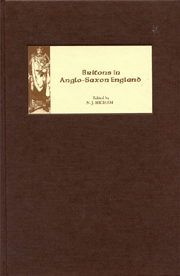Book contents
- Frontmatter
- Contents
- List of Illustrations
- List of Tables
- Contributors
- Dedication
- Acknowledgements
- Abbreviations
- 1 Britons in Anglo-Saxon England: An Introduction
- 2 Anglo-Saxon Attitudes
- 3 Forgetting the Britons in Victorian Anglo-Saxon Archaeology
- 4 Romano-British Metalworking and the Anglo-Saxons
- 5 Invisible Britons, Gallo-Romans and Russians: Perspectives on Culture Change
- 6 Historical Narrative as Cultural Politics: Rome, ‘British-ness’ and ‘English-ness’
- 7 British Wives and Slaves? Possible Romano-British Techniques in ‘Women's Work’
- 8 Early Mercia and the Britons
- 9 Britons in Early Wessex: The Evidence of the Law Code of Ine
- 10 Apartheid and Economics in Anglo-Saxon England
- 11 Welsh Territories and Welsh Identities in Late Anglo-Saxon England
- 12 Some Welshmen in Domesday Book and Beyond: Aspects of Anglo-Welsh Relations in the Eleventh Century
- 13 What Britons Spoke around 400 AD
- 14 Invisible Britons: The View from Linguistics
- 15 Why Don't the English Speak Welsh?
- 16 Place-Names and the Saxon Conquest of Devon and Cornwall
- 17 Mapping Early Medieval Language Change in South-West England
- Index
10 - Apartheid and Economics in Anglo-Saxon England
Published online by Cambridge University Press: 12 September 2012
- Frontmatter
- Contents
- List of Illustrations
- List of Tables
- Contributors
- Dedication
- Acknowledgements
- Abbreviations
- 1 Britons in Anglo-Saxon England: An Introduction
- 2 Anglo-Saxon Attitudes
- 3 Forgetting the Britons in Victorian Anglo-Saxon Archaeology
- 4 Romano-British Metalworking and the Anglo-Saxons
- 5 Invisible Britons, Gallo-Romans and Russians: Perspectives on Culture Change
- 6 Historical Narrative as Cultural Politics: Rome, ‘British-ness’ and ‘English-ness’
- 7 British Wives and Slaves? Possible Romano-British Techniques in ‘Women's Work’
- 8 Early Mercia and the Britons
- 9 Britons in Early Wessex: The Evidence of the Law Code of Ine
- 10 Apartheid and Economics in Anglo-Saxon England
- 11 Welsh Territories and Welsh Identities in Late Anglo-Saxon England
- 12 Some Welshmen in Domesday Book and Beyond: Aspects of Anglo-Welsh Relations in the Eleventh Century
- 13 What Britons Spoke around 400 AD
- 14 Invisible Britons: The View from Linguistics
- 15 Why Don't the English Speak Welsh?
- 16 Place-Names and the Saxon Conquest of Devon and Cornwall
- 17 Mapping Early Medieval Language Change in South-West England
- Index
Summary
WHEN considering and discussing the fate of the Britons within Anglo-Saxon England, we invariably seem to find ourselves forced to choose between two hypotheses. The first of these, and perhaps currently the less fashionable, is that a ‘mass migration’ of Germanic peoples committed genocide against the inhabitants of the Insular territories they conquered, creating a situation in which all subsequent generations of Anglo-Saxons were descended entirely, or almost entirely, from fifth-century immigrants. The second, the ‘elite emulation model’, perhaps most clearly articulated in our editor's 1992 monograph Rome, Britain and the Anglo-Saxons, holds that incoming Germans supplied only an aristocratic elite who farmed large estates tilled by native Britons, who gradually aped their lords and became culturally indistinguishable from them over time. Whilst the elite emulation model has become widely accepted amongst British archaeologists, who have, perhaps, become used to the concept of the diffusion of trends in material culture without recourse to models requiring large-scale population movement, it has proved less easy for historians and linguists to accept. This has largely been due to the perceived problem created by the Anglo-Saxon language: Old English seems far too close in both structure and form to its nearest Continental Germanic neighbours and to lack any substantive evidence of influence from either a Celtic or Romance substratum underlying it, which one would expect had large numbers of Britons switched language on passing acquaintance with their landlords then reinforced their competence only by practising amongst themselves.
- Type
- Chapter
- Information
- Britons in Anglo-Saxon England , pp. 115 - 129Publisher: Boydell & BrewerPrint publication year: 2007



